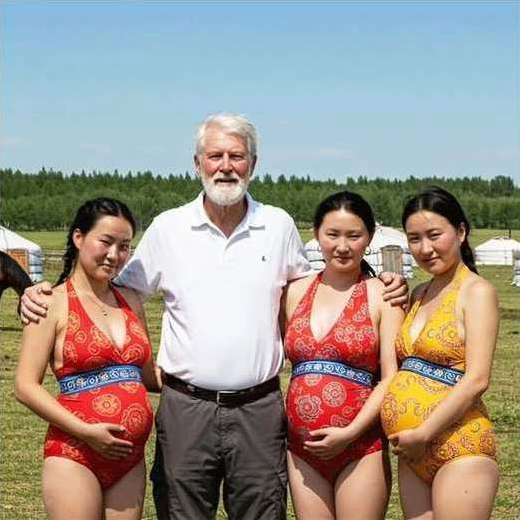David Miller, a man in his fifties from the United States, never imagined that his life would take such an extraordinary turn after years of following a routine that left him feeling empty. Having gone through a failed marriage and decades of monotonous work in a finance department, David reached a point where he felt he had little left tying him to his old life.

With no children and very few close family connections, he carried emotional scars that weighed heavily on him. Searching for peace, renewal, and perhaps even redemption, he made a radical choice: he sold everything he owned and set out to travel abroad, hoping to discover a second chance at life. Initially, David considered Europe or Southeast Asia as possible destinations, but his plans shifted when he came across a documentary highlighting the breathtaking Mongolian steppes. The raw beauty of the wide-open landscapes and the nomadic traditions of the Mongolian people spoke to something deep inside him, drawing him toward the unknown.
Upon arriving in Ulaanbaatar, he began traveling west into more remote areas where the comforts of modern life disappeared. The roads turned to dirt, the cell signals faded, and before long he found himself in a land where time seemed to stand still. In the midst of this vast emptiness, David stumbled upon a small village of yurts. The villagers welcomed him warmly, offering roasted lamb and traditional milk tea. He had unknowingly come across a nomadic tribe known as the Jalin, whose community was marked by humility, generosity, and strong traditions.
Through broken English, gestures, and shared meals, David learned that most of the young men had left the village in search of opportunities elsewhere, leaving behind the women, children, and elders. It was within this setting that David met three sisters—Jalgala, Oyun, and Narin—each with her own distinct personality and charm. Oyun, the most outgoing of the three, spoke some English and often engaged David in conversations about American culture. Jalgala, the eldest, was serious, dependable, and naturally carried the weight of responsibility on her shoulders. Narin, the youngest, was quiet, gentle, and full of kindness.
Over time, David developed a close bond with the sisters, and what began as a simple cultural exchange blossomed into something far deeper and more meaningful. Then came a proposition that left David stunned. The sisters, with the approval of the elders and the blessing of the tribe, asked David to father children with them. It was a tradition rooted in survival, ensuring the continuation of their lineage at a time when so many young men had left. For David, the request felt almost unimaginable—such an arrangement would be unthinkable in the United States, even scandalous—but within the tribe, it was a respected and accepted practice.
After days of contemplation, wrestling with his own doubts and reflecting on the life he had left behind, David decided to accept. A special wedding ceremony was held, marked by drumming, feasting, and the blessings of the elders. The entire village celebrated the union, and David suddenly found himself part of a family that was unlike anything he had ever experienced before. His life quickly transformed as he adapted to the rhythms of nomadic living, sharing responsibilities and joys with the three sisters. Months later, all three sisters became pregnant, a development that brought immense joy to the tribe.
In time, each gave birth to a healthy child, and David, once a lonely divorced man with no family ties, was now a father of three. He embraced his new role wholeheartedly, tending to livestock, chopping wood, fetching water, and helping raise his children. Despite the hardships of sandstorms and harsh winters, his bond with the sisters deepened, and together they created a home full of laughter, care, and love. As the children grew, discussions about the future emerged. Should they move closer to a city to secure education and healthcare for the children? Should David one day return to the U.S. to prepare for a more stable life abroad?
These questions remained unanswered, yet the foundation of love and loyalty between David and the sisters remained unshakable. The tribe continued to support him, considering him not as an outsider but as one of their own. A year after his arrival, David’s life had been transformed completely. He was no longer the man burdened by a failed marriage and the monotony of corporate life; instead, he was a father, a partner, and a respected member of a community that valued him deeply.
Although he sometimes missed the convenience of modern American life, he knew that what he had found in Mongolia was worth far more than anything he had left behind. In a world where so many people cling to conventional paths, David’s story serves as a reminder that meaning and fulfillment can be found in the most unexpected places. His journey, marked by risk, responsibility, and love, proved that the wildest detours often lead to the richest and most rewarding destinations imaginable.





